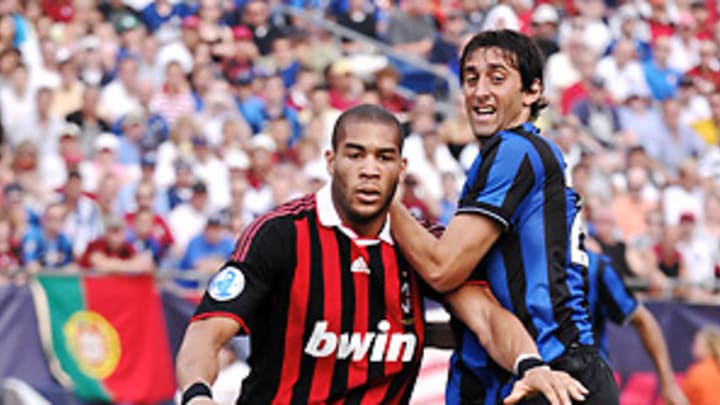Americans need to get on the field

To be precise, I keep hearing that famous bit of wisdom uttered by the tattooed, gun-slinging guard when he was with the Philadelphia 76ers: "We talking about practice. Not a game. Not a game. Not a game. We talking about practice."
Needless to say, A.I. didn't last much longer in the City of Brotherly Love. Practice is vital to success. It's where teams find their chemistry, defenses nail down their positioning, offenses find their rhythm and coaches make their final decisions. Mocking all that is worth a one-way ticket to Denver.
In some ways, though, Iverson had a good point: Practice, as important as it is to coaches, is not where it counts most. The game, in the end, is everything. A player, no matter what he thinks of practice, is judged by the fans and the media on how he performs between the opening and final whistle.
There's a corollary to all this, one that's somewhat particular to soccer: namely, that a game in and of itself can be a form of practice. Every game, of course, carries a unique amount of weight. For a club such as Manchester United, an early-round FA Cup match against Huddersfield Town doesn't carry the same import as a Champions League group-stage opener against Besiktas. (Those two play Tuesday in Istanbul, by the way, at what I can attest is one of the loudest stadiums in the world. Karakartal!)
This hierarchy of match importance -- this relativism to which Iverson unknowingly alluded -- also bears strongly on a national team, particularly the U.S., which long has had too many players either sitting on the bench or playing in comparatively meaningless games. As Landon Donovan has mentioned more than once to me and other reporters, it's vital for American players not only to play, but also to play in big matches. This is the only way they will be prepared for international crunch clashes like a qualifier at Azteca or a must-win game in Rustenburg, South Africa.
Well, it doesn't get much bigger than a Champions League match. As it stands right now, three U.S. national-team players have a shot at seeing Champions League action this year: AC Milan's Oguchi Onyewu and the Rangers duo, DaMarcus Beasley and Maurice Edu. Sadly, none of them likely will see the field for the kind of "practice" they need.
Edu would, but he's injured and unavailable for Rangers' trip to Stuttgart on Wednesday. Beasley is so far down the bench at Ibrox, he might as well be playing for Celtic. He's in the same boat with the national team, but that's nothing a good stretch of games for his club wouldn't change.
Meanwhile, Gooch has yet to see any playing time for Leonardo's side. He might yet, given the Rossoneri's recent form (a 0-0 draw at away to Livorno?!?), but I wouldn't bet a bottle of Barbaresco on his kicking a ball -- or an opponent -- in Tuesday's match at Olympique Marseille.
The ironic twist is that Onyewu's old club, Standard Liège, is also in the group stage of the Champions League. The defending Belgian league champions open up play at home to English Premier League giant Arsenal. Onyewu most definitely would be in the starting XI for that match. Any regrets?
The Europa League offers better opportunity to the two Americans involved. Goalkeeper Tim Howard is sure to get the start for Everton when it welcomes Greek side AEK to Goodison Park on Thursday. And Fulham star ClintDempsey should play a big role when the Cottagers travel to Bulgaria to take on CSKA Sofia. (Americans on the books at other Europa League sides -- EddieJohnson at Fulham, Dominic Cervi at Celtic, Jared Jeffrey at Club Brugge and Bryan Arguez at Hertha Berlin -- most likely aren't going to play even a minute.)
Everton-AEK and CSKA Sofia-Fulham may not sound like earth-shattering tilts, but there's always a heightened sense of pressure and an adaptive, unique style of play when playing continentally. There's a lot of money and prestige on the line.
The rest of the Americans overseas will be home twiddling their big toes this week. Carlos Bocanegra's Rennes came close to a Europa League spot last season, but missed it by three points. Same with Steve Cherundolo's Hannover. Jozy Altidore's former club, Villarreal, is in the Europa League, but Altidore is now with Hull City. Michael Bradley's Borussia Mönchengladbach is lucky just to be in the top flight of the Bundesliga, let alone in Europe. FreddyAdu is, well, Freddy Adu, so there was no chance he was going to feel the glory of Europe.
At some point, this all has to change. The U.S. regulars need to sign with bigger clubs that play bigger matches. Under the microscope of the Champions League and Europa League, they will improve their ability to perform under pressure, which is ultimately the most important practice they can get.
